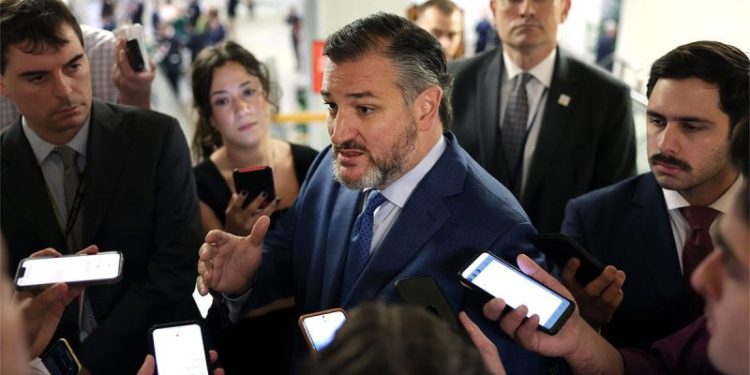Republican senators issued a torrent of criticism against U.S. District Judge James Boasberg this week after it was revealed that he had signed off on subpoenas and gag orders issued as part of former Special Counsel Jack Smith’s investigation — though a cursory review of court rules suggests it is far less provocative than lawmakers have claimed.
Sens. Ted Cruz, R-Texas, and Marsha Blackburn, R-Tenn., were among the Republicans who blasted Boasberg as an ‘activist’ judge, and Cruz, for his part, suggested Boasberg should be impeached.
‘My assumption,’ Cruz fumed, is ‘that Judge Boasberg printed these things out like the placemats at Denny’s — one after the other.’
At issue were subpoenas and gag orders issued by former special counsel Jack Smith’s team as part of its probe into President Donald Trump’s actions in the wake of the 2020 election.
The redacted documents were made public this week by Sen. Chuck Grassley, R-Iowa.
They included subpoenas of phone records for 10 senators and one House lawmaker, and gag orders sent to Verizon and AT&T instructing them not to notify lawmakers of the subpoena. (Verizon complied, AT&T did not.)
Both the subpoenas and gag orders were signed by U.S. District Judge James Boasberg, according to the newly released documents — a detail that prompted fresh criticism and indignation from some of the Republicans in question, including Cruz, who blasted the investigation in question as ‘worse than Watergate’ and a gross violation of prosecutorial powers.
Blackburn blasted Boasberg as an ‘activist’ judge. Some lawmakers further argued for his impeachment as a result of his involvement.
In fact, his role in the process is far from surprising.
Local rules for the federal court system in D.C. explicitly state the chief judge ‘must hear and determine all proceedings before the grand jury.’ The subpoenas and gag orders signed by Boasberg were signed in May 2023 — roughly two months into his tenure as the chief judge for the federal court.
It’s unclear whether Sens. Cruz or Blackburn were aware of this rule, and they did not immediately respond to Fox News Digital’s request for comment.
But it’s also not the first time Judge Boasberg previously noted his oversight of these matters as the chief judge for D.C. — including in the special counsel probe in question.
Boasberg explained the rule in question in June 2023, when he granted, in part, a request from media outlets to unseal a tranche of redacted documents related to the subpoena and testimony of former Vice President Mike Pence in the same probe. (He explained in a lengthy public memo that he did so because the press movant were seeking record that Pence himself had discussed publicly.)
Still, the controversy comes as Boasberg has found himself squarely in Trump’s crosshairs, after he issued a temporary restraining order in March blocking Trump’s use of a 1798 wartime law to deport hundreds of Venezuelan nationals to a maximum security prison in El Salvador.
Until that point, however, Boasberg had largely avoided making headlines.
A graduate of Yale, Oxford University and Yale Law School, Boasberg clerked for the U.S. Ninth Circuit Court of Appeals before joining the Justice Department as a federal prosecutor in Washington, D.C.
He was tapped in 2002 by then-President George W. Bush to serve on the D.C. Superior Court, where he served until 2011, when he was nominated by President Barack Obama to the federal bench in D.C. in 2011.
His confirmation vote soared through the Senate with a 96-0 vote of approval, including with the support of Sen. Grassley and other Republicans named in the subpoena.
Boasberg in 2014 was appointed by Supreme Court Chief Justice John Roberts to a seven-year term on the U.S. Foreign Intelligence Surveillance Court, or FISA Court, comprised of 11 federal judges hand-selected by the chief justice.
Former special counsel Jack Smith, for his part, has since defended his decision to subpoena the Republican lawmakers’ phone records, which Fox News Digital reported includes phone records for a four-day period surrounding the Jan. 6 Capitol riot.
They did not include the contents of phone calls or messages, which would require a warrant, but they did include ‘[call] detail records for inbound and outbound calls, text messages, direct connect, and voicemail messages’ and phone number, subscriber, and payment information.
His lawyers told Senate lawmakers in a letter earlier this month that the decision to do so was ‘entirely proper’ and is consistent with Justice Department policy.
Fox News’s Ashley Oliver contributed to this report.














